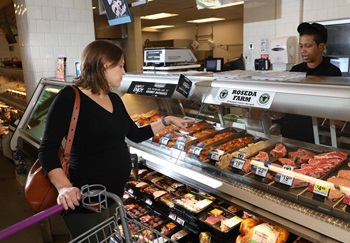By Heather Garlich, Senior Vice President, Communications, Marketing & Consumer/Community Affairs, FMI

We’ve witnessed in our U.S. Grocery Shopper Trends exploration that many Americans extend the notion of “eating well” to both wellness and ethics. In fact, 22% of shoppers say they seek out product claims that showcase ethical practices, and this activity has been consistent over the last two years, even during the pandemic. Ten percent of shoppers look for cage-free claims while almost 10% of shoppers say they seek out free-range, fair trade and certified humane labels on food products, respectively.
Consumers remain interested in how livestock and poultry that produce milk, meat, poultry, and eggs are being raised. Brands are fielding those questions against the backdrop of mounting pressures from outside groups – many of whom are opposed to the consumption of animal protein – to adopt practices that arguably don’t have science-based guidelines or might be counter to science-based programs. Several companies have responded by consulting with experts, re-examining their animal welfare policies and presenting them in a shopper-facing style. While companies that have strong policy statements reflecting transparent standards and best practices are not immune to criticism, having these programs in place allows for more meaningful and trusted dialog with the audience that truly matters most: Their shoppers. These policies also allow for and encourage opportunities for continuous improvement.
FMI recently partnered with Animal Ag Alliance on a briefing for FMI members and members of the National Restaurant Association to reassess the activist and NGO landscape and reengage with the Alliance on tools and resources that enable productive dialog with consumers. Hannah Thompson-Weeman, president and CEO of the group, stressed the importance of proactively addressing animal welfare and sustainability practices, encouraging retailer and restaurant brands to collaborate with their suppliers to establish and clearly articulate shared values on key issues, and explore the development of a consumer-facing policy statement.
FMI continues to work in partnership with the food and agricultural community, environmental organizations and other experts to develop guidelines that promote the long-term viability of the world’s food supply. To access FMI-member-endorsed policy statements that promote animal welfare, visit the social responsibility section of our website.


 Industry Topics address your specific area of expertise with resources, reports, events and more.
Industry Topics address your specific area of expertise with resources, reports, events and more.
 Our Research covers consumer behavior and retail operation benchmarks so you can make informed business decisions.
Our Research covers consumer behavior and retail operation benchmarks so you can make informed business decisions.
 Events and Education including online and in-person help you advance your food retail career.
Events and Education including online and in-person help you advance your food retail career.
 Food Safety training, resources and guidance that help you create a company food safety culture.
Food Safety training, resources and guidance that help you create a company food safety culture.
 Government Affairs work — federal and state — on the latest food industry policy, regulatory and legislative issues.
Government Affairs work — federal and state — on the latest food industry policy, regulatory and legislative issues.
 Get Involved. From industry awards to newsletters and committees, these resources help you take advantage of your membership.
Get Involved. From industry awards to newsletters and committees, these resources help you take advantage of your membership.
 Best practices, guidance documents, infographics, signage and more for the food industry on the COVID-19 pandemic.
Best practices, guidance documents, infographics, signage and more for the food industry on the COVID-19 pandemic.
